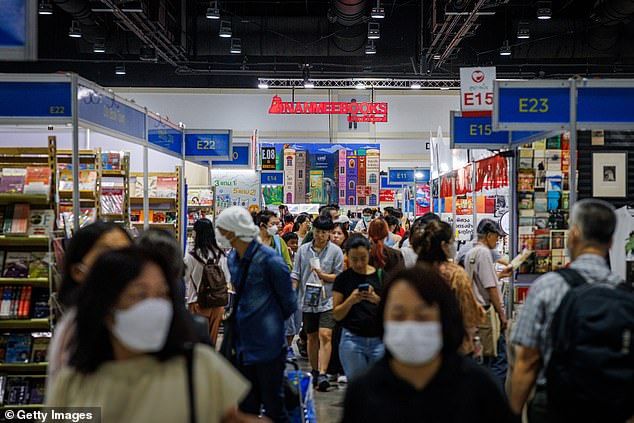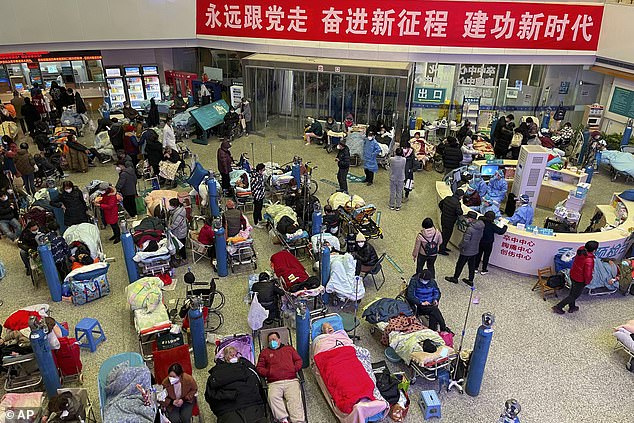Some experts are urging people to mask up amid rising alarm over a new Covid variant — and fears of a summer wave of infections.
The NB.1.8.1 strain is already thought to be driving a wave of infections across China, Hong Kong and Thailand — along with upticks in hospitalizations.
In the US, there have been fewer than 20 cases detected to date. But the strain has been detected in travelers arriving in California, Washington state, Virginia and New York City, raising fears it may be spreading quickly.
Lab tests suggest the variant is more infectious than currently circulating strains, which means it could lead to a spike in infections and potentially hospital admissions.
In Hong Kong, officials are already urging people to mask up, particularly while on public transport or in crowded places.
And in the US, chatter about masks is beginning to creep in. Dr Amy Edwards, a pediatrician at Case Western Reserve University in Cleveland, Ohio, told CBS News today that anyone who feels a ‘little under the weather’ should ‘wear a mask’.
Another expert calling for masks is Dr Melanie Matheu, an immunologist from California who previously studied at the University of California, San Francisco.
She told her 336,000 TikTok followers the US should brace for a ‘summer wave’ worse than that from the previous year.

The above shows people wearing facemasks in Bangkok, Thailand, in March this year – which is among the countries reporting an uptick in Covid cases thought to be due to the new variant
Your browser does not support iframes.
NB.1.8.1 was declared a variant under monitoring by the World Health Organization on Friday.
Patients sickened with the strain are suffering from similar symptoms to those infected with other variants, scientists say, including a fever, cough, sore throat and fatigue.
It is not clear how many deaths due to the variant have been recorded.
In China, data shows the proportion of severely ill respiratory patients with Covid has jumped from 3.3 to 6.3 percent over the last month, while the proportion of Chinese ER patients testing positive for the disease has jumped from 7.5 to 16.2 percent.
Officials in Taiwan are also reporting a surge in Covid ER admissions, with numbers rising 78 percent in a week over the seven days to May 3, the latest data shows.
And in Hong Kong, the proportion of swabs testing positive for the virus has now hit a 12-month high — at 13.66 percent of samples used.
Dr Edwards said: ‘If you’re a little under the weather, but well enough to be out and about, wear a mask.’
Advising on other strategies to control the virus, she said: ‘Good cough and sneezing hygiene, good hand washing, staying home if you’re not feeling well to keep other people from catching what you’ve got.’
Dr Matheu added: ‘My advice would be the same around these variants.
‘Make sure you get your updated booster, wear a mask — especially if you are vulnerable, high risk, live or work with anyone who is vulnerable or high risk — and make sure there is good air circulation in your indoors and areas where you work.’

The above shows a hospital in China in January 2023. Many of the patients shown are elderly and were reported to be suffering from Covid

The above image is also from the mystery outbreak that gripped China back in January 2025
Authorities in Hong Kong have already urged people to start wearing face masks again amid concern over the new variant.
In a statement posted to the Hong Kong Department of Health’s website, officials said: ‘High-risk persons (e.g. persons with underlying medical conditions or persons who are immunocompromised) should wear surgical masks when visiting public places.
‘The general public should also wear a surgical mask when traveling on public transport or staying in crowded places.
‘When respiratory symptoms appear, one should wear a surgical mask, consider avoiding going to work or school, avoid going to crowded places and seek medical advice promptly.’
Your browser does not support iframes.
A spokeswoman for the CDC said the agency was ‘aware’ of the new variant, but said few cases had been detected to date.
NB.1.8.1 was first detected in January this year and is thought to have originated somewhere in Asia.
To date, it has now spread to 22 countries and a total of 518 cases have been detected. There is no data on hospitalizations or deaths.
Scientists say, however, that the infection figures are likely a huge underestimate — pointing out that many now do not test for Covid and that government’s have majorly scaled back their Covid variant monitoring programs.
The proportion of cases caused by the variant is spiking globally, and is up four-fold in the latest month with data available. It was behind 2.5 percent of all Covid cases globally at the start of April, but by the end of the month, this had surged to 10.7 percent.
Travelers arriving in the US infected with the variant arrived between April 22 and May 12 from the following countries: China, Japan, Vietnam, South Korea, Taiwan, Thailand, France, the Netherlands and Spain.
The variant has also been detected in Hawaii, Rhode Island and Ohio.